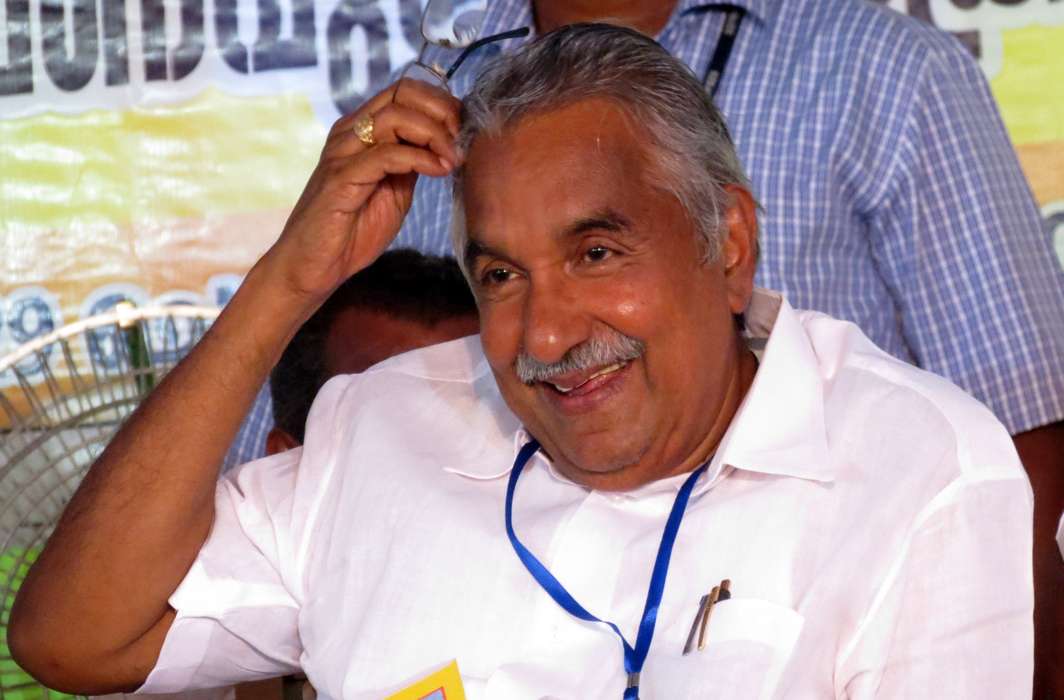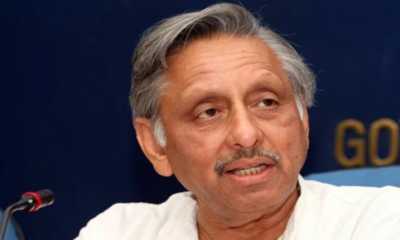[vc_row][vc_column][vc_column_text]Probe ordered over Chandy’s alleged role in Rs 7 crore solar scam which was said to be a major trigger for the Congress’ defeat in Kerala Assembly polls in 2016
A little over a year after he lost power to the Left Front and found his clean image dented by allegations of his involvement in the Rs 7 crore solar scam, former Kerala chief minister Oomen Chandy now faces a vigilance and criminal probe in the case.
The Pinarayi Vijayan-led Left Democratic Front (LDF) government, on Wednesday, ordered a criminal and vigilance probe against Chandy, three of his ministers, and many other Congress leaders in connection with the multi-crore solar scam case.
The alleged scam, since it came to light in 2013, had become a major embarrassment for the Chandy government. Insinuations were made at the then chief minister of financial impropriety and at a host of other Congress leaders in the state of having illicit physical relations with the main beneficiary of the scam – Saritha Nair – who reportedly floated a fictitious company promising imported solar panels.
The scam was seen as a major trigger for the defeat of the Chandy-led United Democratic Front (UDF) government in the state even though most people in Kerala found allegations of the then chief minister’s role in the scam hard to digest as he had a reputation of being an honest politician.
On Wednesday, Kerala chief minister Pinarayi Vijayan – who had led the broadside against Chandy over the solar scam in the run up to the state’s assembly polls in 2013 – said the vigilance probe was ordered on the basis of a report submitted by the Justice Sivarajan Commission that looked into various aspects of the alleged fraud. The Commission had submitted its report to Vijayan in September.
Besides Chandy, Congress leaders Thiruvanchur Radhakrishnan, Anil Kumar, and Aryadan Mohamed will also face the probe, sources said.[/vc_column_text][vc_column_text css=”.vc_custom_1507725486385{padding-top: 10px !important;padding-right: 10px !important;padding-bottom: 10px !important;padding-left: 10px !important;background-color: #a2b1bf !important;border-radius: 10px !important;}”]The Solar scam: a tale of sex, sleaze and corruption
The solar scam was related to a fictitious firm floated by a Saritha Nair and her partner Biju Radhakrishnan. Nair has been a controversial woman who allegedly cheated many gullible investors with the help of people sitting in high offices of the Kerala government.
Nair and Biju Radhakrishnan, the prime accused in the scam, were sentenced to three years in jail and slapped a fine of Rs 10,000 each in December last year. While Nair is out on bail, Radhakrishnan is still in prison on charges of murdering his first wife, Reshmi.
When the scam broke, there had been reports that officials from then chief minister Oomen Chandy’s office had helped Nair and Radhakrishnan in amassing around Rs 7 crore by cheating investors through promises of supplying them with imported solar panels. At least three staff members in Chandy’s office had to be shunted out due to the reports but the decision didn’t help the then Congress-led UDF government in beating the perception battle as soon rumours emerged that Nair had illicit physical relations with several UDF politicians.
Nair had famously reportedly told The Indian Express that she was very close to Chandy and that she had the freedom to walk into the chief minister’s home anytime. The claim had immediately been rubbished by Chandy.
Nair had also told investigators that hundreds of phone calls were made between her and Chandy’s personal staff, both in Kerala and in Delhi. A First Post report said that records showed that “in 2012-13, Nair and Thomas Kuruvilla (Chandy’s aide in New Delhi) had exchanged 205 telephonic calls. Chandy’s gunman Salim Raj and Nair had spoken 416 times during the same period, clearly indicating her infiltration into Chandy’s official space. Nair had also alleged that she paid a bribe of Rs 1.9 crore to Chandy through Kuruvilla.”
A special investigation team under director general of police Rajesh Diwan was constituted by Vijayan after the victory of the LDF coalition in the Assembly polls in May 2016 to probe charges against leaders whose names had figured in the scam.[/vc_column_text][vc_column_text]With the Sivarajan Commission taking the position that getting sexual favours in lieu of extending cooperation will be treated as a case of bribery, several prominent leaders whose names figured in Nair’s deposition before the panel, are now expected to come under the radar. Nair had given the names to the Sivarajan Commission in a “strictly confidential” sealed cover in February 2016, stating dramatically that this is the “truth about my illicit relations with politicians”.
Chandy has maintained the same defence that he had presented when the case first broke – that the charges being leveled against him are “politically motivated”.
On Wednesday, he said: “I don’t fear the case. I haven’t done anything wrong. Let the law take its own course.”
Congress veteran and former state cabinet minister Ramesh Chennithala – who is known as a Chandy rival within his party – has also criticised the vigilance probe, claiming that iut has been ordered by Vijayan to influence the by-poll in Vengara assembly constituency in Malappuram district. The by-poll has been necessitated after Muslim League leader PK Kunhalikutty was elected to the Lok Sabha.[/vc_column_text][/vc_column][/vc_row]


 India News11 hours ago
India News11 hours ago
 India News11 hours ago
India News11 hours ago
 Cricket news11 hours ago
Cricket news11 hours ago
 Latest world news11 hours ago
Latest world news11 hours ago
 Latest world news8 hours ago
Latest world news8 hours ago
 LATEST SPORTS NEWS5 hours ago
LATEST SPORTS NEWS5 hours ago














